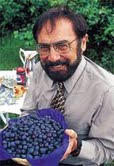James A. Joseph

Dr. James Joseph, director of the Neuroscience Laboratory at the USDA-ARS Human Nutrition Research Center on Aging (HNRCA) at Tufts University, died on Tuesday, June 1, 2010 - he was 66 years old. Dr. Joseph is survived by his wife Marlene.
Born in West Virginia, Dr. Joseph earned his BS in biology from Fairmont State College, his MA at West Virginia University, and his Ph.D. in behavioral neuroscience from the University of South Carolina in 1976. He then completed a post-doctoral fellowship at the NIA’s Gerontology Research Center (GRC) in Baltimore, MD, and went on to work both at Lederle Laboratories and the Armed Forces Radiobiology Institute before returning to work as a senior scientist at the GRC. In 1993, Dr. Joseph joined the USDA-ARS Human Nutrition Research Center on Aging (HNRCA) at Tufts University as the director of the Neuroscience Laboratory – a position he held until his unexpected death.
Dr. Joseph devoted his career to studying the mechanisms involved in age-related neuronal losses and subsequent deficits in motor and cognitive behavior. One of his most significant findings was that diets, supplemented with fruits, vegetables, and/or nuts, could forestall or even reverse age-related declines in cognitive and motor function. As lead scientist, he has authored or co-authored over 260 scientific articles, over 40 book chapters, and 2 books. One book, The Color Code: A Revolutionary Eating Plan for Optimum Health, which outlines to lay audiences ways to improve diet through the inclusion of colorful fruits and vegetables, has been translated into 5 languages and plays a part in improving the diet of many in the United States and abroad.
Dr. Joseph’s contributions to nutrition, neuroscience, and gerontology have also earned him the 1989 Sandoz Prize in Gerontology, the Stephanie Overstreet Award in Alzheimer Research, the 2000 Alex Wetherbee Award, the 2002 Glenn Foundation Award for Aging Research, the 2004 Harman Research Award, the 2005 International Award for Modern Nutrition, the 2007 USDA-ARS North Atlantic Area-Scientist of the Year award, and the 2009 GlaxoSmithKlein award for Flavanoid Research, among others.
In the lab, Dr. Joseph was a talented scientist, a vivacious supervisor, and a successful mentor. Outside the lab, he was an outdoor adventurer, an entertaining friend, a loving husband, and above all a faithful Catholic. His many contributions will be missed by all who knew him.
“Does [our research] guarantee that blueberries will have the same effect in humans? Of course not. But I’m not waiting for the evidence to come in. I’m eating blueberries now. They taste good. And compared to some widely touted “anti-aging remedies” like growth hormone injections, they are considerably safer.” ~The Color Code
Memorial contributions may be made through the American Aging Association: http://www.americanaging.org/JimJosephFund.htm.
Select Publications
Roth, G.S., Joseph, J.A. and Mason, P. Membrane alterations as causes of impaired signal transduction in Alzheimer's disease and aging. Trends in Neurosci., 1995, 18, 203-206.
Joseph, J.A., Shukitt-Hale, B., Denisova, N.A., Bielinski, D., Martin, A., McEwen, J.J. and Bickford, P.C. Reversals of age related declines in neuronal signal transduction, cognitive and motor behavioral deficits with diets supplemented with blueberry, spinach or strawberry dietary supplementation. J. Neurosci. 1999, 19, 8114-8121.
Joseph, J.A., Shukitt Hale, B., Denisova, N.A., Martin, A., Perry, G., and Smith, M.A. Copernicus revisited: Amyloid beta in Alzheimer's disease. Neurobiol. Aging 2001, 22: 131-146.
Joseph, J.A., Fisher, D.R., and Strain, J. Muscarinic receptor subtype determines vulnerability to oxidative stress in COS-7 cells. Free Radic. Biol. Med. 2002, 32: 153-161.
Joseph, J.A., Arendash, G., Gordon, M., Diamond, D., Shukitt Hale, B., and Morgan, D. Blueberry supplementation enhances signaling and prevents behavioral deficits in an Alzheimer disease model. Nutr. Neurosci. 2003, 6: 153-162.
Joseph, J.A., Carey, A.N., Brewer, G.J., Neuman, A., Lau, F.C., and Fisher, D.R. Dopamine and Aß-induced stress signaling and decrements in Ca2+ buffering in primary neonatal hippocampal cells are antagonized by blueberry extract. J. Alz. Dis. 2007, 11(4), 433-446.
Krikorian, R., Shidler, M., Nash, T., Kalt, W., Vinqvist-Tymchuk, M., Shukitt-Hale, B., Joseph, J.A. Blueberry supplementation improves memory in older adults. J. Agri. Food Chem. 2010, 58, 3996-4000.





















